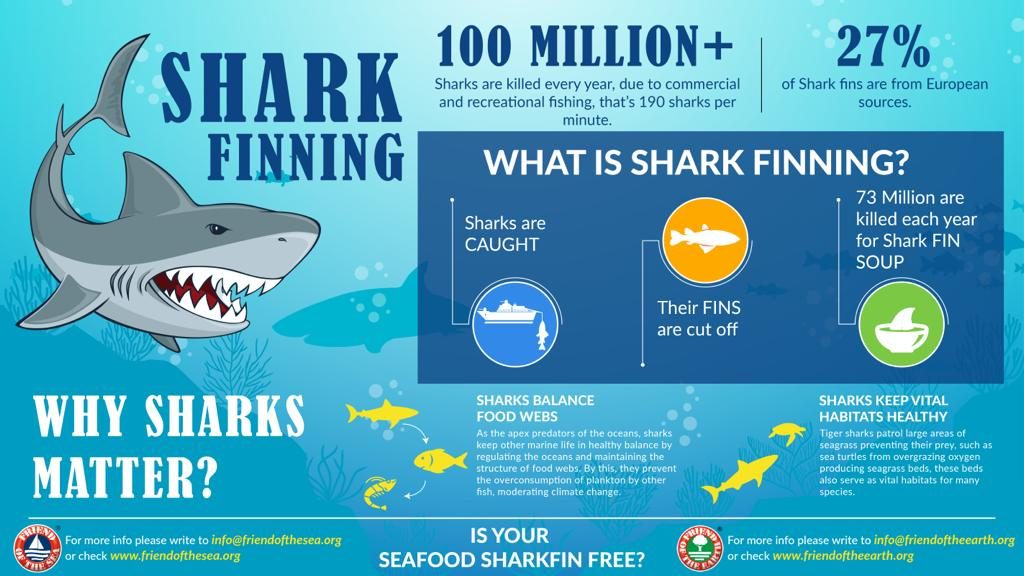The Problem
Sharks and rays have existed for over 420 million years. They are a group of fish characterized by a cartilaginous skeleton, five to seven gill slits on the sides of the head, and pectoral fins that are not fused to the head. They have a covering of dermal denticles that protects their skin from damage and parasites in addition to improving their fluid dynamics. They have numerous sets of replaceable teeth. Sharks generally do not live in freshwater although there are a few known exceptions, such as the bull shark and the river shark, which can be found in both seawater and freshwater. Well-known species such as the tiger shark, blue shark, great white shark, mako shark, thresher shark, and hammerhead shark are apex predators—organisms at the top of their underwater food chain.
Sharks and rays are targeted by fisheries for shark fins and gill plates respectively, which fetch exorbitant prices due to their high demand as a delicacy in some Asian countries. There is also a market for shark meat, with European countries providing the biggest market. In addition to being targeted for their fins and meat, sharks often end up in fishing nets as incidental bycatch.According to a recent TRAFFIC report that highlights the major shark catchers, traders and affected species, the top 20 shark catching countries in the world caught more than 600,000 metric tons of sharks and rays each year between 2007-2017, with the top five countries — Indonesia, Spain, India, Mexico and the United States — catching a whopping 333,952 metric tons on average between them each year. It is estimated that up to 100 million sharks are caught globally each year. According to the report, 16,177 metric tons of shark fin, valued at around USD294 million per year, were imported globally each year between 2000-2016, with 90% of these shark fin products being imported by four countries: Hong Kong SAR (9,069 mt/year), Malaysia (2,556 mt/year), mainland China (1,868 mt/year, and Singapore (1,587 mt/year). Brazil, Spain, Uruguay and Italy collectively accounted for an average of 57% of global shark meat imports during the ten year study period

Environnemental Consequences
These irresponsible and unsustainable fishing practices have resulted in alarming declines in a wide range of shark species. A quarter of the approximately 1,150 species of sharks and rays currently in danger of going extinct. Since sharks are slow growing, only reach maturity relatively late in life, and have long reproductive cycles — often giving birth to less than a dozen pups every one to two years, they are particularly vulnerable to being overfished.
Despite conservation efforts, 17% of sharks and rays are currently listed as Critically Endangered, Endangered, or Vulnerable in the IUCN Red List, while 13% have a status of Near Threatened, and 47% are categorized as Data Deficient. Only 23% of all shark and ray species are listed under the category of Least Concern (Dulvy et al, 2014).
The regions identified as hot spots include the Coral Triangle in the Indo-Pacific and the Mediterranean (where it is estimated that around 50% of all shark and ray species are threatened with extinction).
Sharks are top predators that play an important ecological role in marine ecosystems. Their health and wellbeing is therefore vital for maintaining healthy oceans — and by extension, vital for the communities that depend on the oceans for their food security and livelihoods. Ironically, this also applies to the very fishermen who target them.
Maintaining shark biodiversity is important for several reasons, including:
- Keeping Oceans Healthy — Sharks prey on sick, weak and old marine animals, and help control populations of other marine creatures. This helps to prevent disease from spreading, improves the genetic fitness of marine life, and keeps marine ecosystems in balance.
- Recreation — Sharks and shark cage diving are a major attraction for marine eco-tours in some regions, giving tourists and divers the opportunity to experience or interact with sharks close-up in their natural environment.
- Economic Benefits — Shark ecotourism and shark fisheries both provide employment opportunities for coastal communities around the world. The unsustainable harvesting of sharks could cause these industries to collapse, putting the livelihoods of communities that depend on them at risk.
- Global Biodiversity — Sharks play an important role in supporting marine biodiversity. With 400 species (1,150 if you include rays) they not only add to species diversity, but as top predators they are also essential for maintaining the diversity of other species too.
Possible Solutions to save the Sharks
As overfishing is the primary cause of the decline in shark populations globally, promoting responsible fisheries management practices and putting trade regulations in place to protect vulnerable shark species, are both important strategies for preventing further decline of shark populations. Having a clearer understanding of who is responsible for catching and trading sharks is key to improving shark fishery management. Ultimately we need to focus on three primary goals if we hope to reverse the downward trend:
- Responsible consumption
- Sustainable management
- Responsible trade
- Creating Marine Protected Areas (MPAs) for sharks
- Research, awareness and education.
WSO Activities and Initiatives
The World Sustainability Organization, under its Friend of the Sea programme, supports the Maldives Whale Shark Research programme’s community focused conservation initiatives and its dedication to learning more about whale sharks and conserving the rich biodiversity and fragile marine ecosystems that both whale sharks and the Maldives community depend on.
The Friend of the Sea’s Sustainable Fisheries and Fleets certification program promotes the responsible harvesting of marine resources, including sharks. In order to qualify for certification, fishing fleets must use sustainable, legal fishing practices; they must not target overexploited species; and they must not have any bycatch listed as Vulnerable or worse on the IUCN Red List.
Friend of the Sea has also launched a successful Change.org campaign which led Just Eat, Deliveroo and Menulog to take shark fin soups off their menu.
Call to Action
Friend of the Sea encourages shark fishing companies that employ sustainable fishing practices, as well as companies that supply sustainably sourced shark products, to apply for Friend of the Sea sustainable fisheries and fleets certification. Importers and consumers alike are becoming more environmentally conscious and like to know that the seafood they purchase is harvested sustainably. The Friend of the Sea label helps consumers to choose sustainably harvested shark products rather than simply avoiding shark products altogether for ethical reasons. Friend of the Sea certification encourages sustainability in the fishing industry and serves as a marketing tool to help companies promote their environmental efforts.
You can also contribute to sharks conservation by signing Friend of the Sea’s petition to take Mustelus asterias (Starry Smoothhound, Palombo) off the menu. We also revamped the Change.org petition which lead Deliveroo and Just Eat to take sharkfin soups off their menu by asking them not to collaborate with those Chinese restaurants proposing Sharkfin soups on site.
How you can help save the Sharks
Friend of the Sea encourages seafood companies who financially benefit from fisheries that are putting albatrosses and other seabirds at risk of extinction to engage at implementing Sharks bycatch reduction methods.
Longlines and trawlers are mostly catching tuna, swordfish, cod, hake, shrimps and herrings. Check with your seafood provider and at restaurants if those species are caught by Friend of the Sea certified fleets.
You can support the Save the Sharks campaign by signing the Change.org petition, which will help Friend of the Sea convince seafood and fishing companies to make a change benefit both the fishing industry and conservation.
If we all work together, we can save these magnificent predators from extinction.









